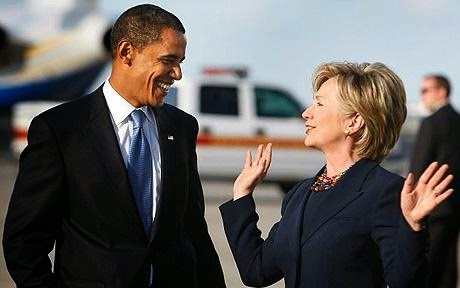Obama's and Hillary's Competing Syrian Counterfactuals
Two recent interviews with Barack Obama and Hillary Clinton are notable for their inclusion of competing counterfactual claims.
In his recent interview with President Obama in The New York Times, Tom Friedman elicited several counterfactual observations from the President on Syria.
In his recent interview with President Obama in The New York Times, Tom Friedman elicited several counterfactual observations from the President on Syria.
To Friedman’s question “wouldn’t
things be better had we armed the secular Syrian rebels early or kept U.S.
troops in Iraq? “ Obama declared:
“The fact is…in Iraq a residual U.S. troop presence would never
have been needed had the Shiite majority there not “squandered an opportunity”
to share power with Sunnis and Kurds. “Had the Shia majority seized the
opportunity to reach out to the Sunnis and the Kurds in a more effective way,
[and not] passed legislation like de-Baathification,” no outside troops would
have been necessary. Absent their will to do that, our troops sooner or later
would have been caught in the crossfire….”
With “respect to Syria,” said the president, the notion that
arming the rebels would have made a difference has “always been a fantasy. This
idea that we could provide some light arms or even more sophisticated arms to
what was essentially an opposition made up of former doctors, farmers, pharmacists
and so forth, and that they were going to be able to battle not only a
well-armed state but also a well-armed state backed by Russia, backed by Iran,
a battle-hardened Hezbollah, that was never in the cards.”
In short, Obama uses his “what if?”
scenario to argue that history would not have turned out any better.
By contrast, Hillary Clinton seems
to believe otherwise
In her interview
with Jeffrey Goldberg in The Atlantic,
Clinton was asked about US Ambassador to Syria Robert Ford’s criticism of
Obama’s failure to do “enough to build up a credible Syrian
opposition when we could have.”
She replied with a series of
counterfactuals:
The first was hesitant: “I can’t sit here today and say that if we
had done what I recommended, and what Robert Ford recommended, that we’d be in
a demonstrably different place.”
But then she added: “I
did believe…that if we were to carefully vet, train, and equip early on a core
group of the developing Free Syrian Army, we would, number one, have some
better insight into what was going on on the ground. Two, we would have been
helped in standing up a credible political opposition.
So I did think that eventually, and I said
this at the time, in a conflict like this, the hard men with the guns are going
to be the more likely actors in any political transition than those on the
outside just talking. And therefore we needed to figure out how we could
support them on the ground, better equip them….
Goldberg then replied: “Do you think we’d be where we are with ISIS right now if the U.S. had
done more three years ago to build up a moderate Syrian opposition?”
Clinton
replied: “Well,
I don’t know the answer to that. I know that the failure to help build up a
credible fighting force of the people who were the originators of the protests
against Assad—there were Islamists, there were secularists, there was everything
in the middle—the failure to do that left a big vacuum, which the jihadists
have now filled.”
In contrast to Obama’s counterfactual,
Clinton used her “what if?” scenario to imply how history might have been
better.
Clinton’s counterfactual is much more
hesitant than Obama’s. Political
calculation explains this, as she cannot go on record criticizing her previous
boss too overtly heading in to the 2016 election cycle.
But it will bear watching whether the
intensifying crisis in the Middle East leads to many more Monday morning
quarterbacking counterfactuals.



Comments